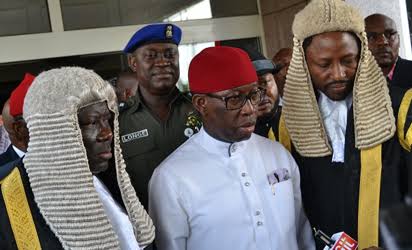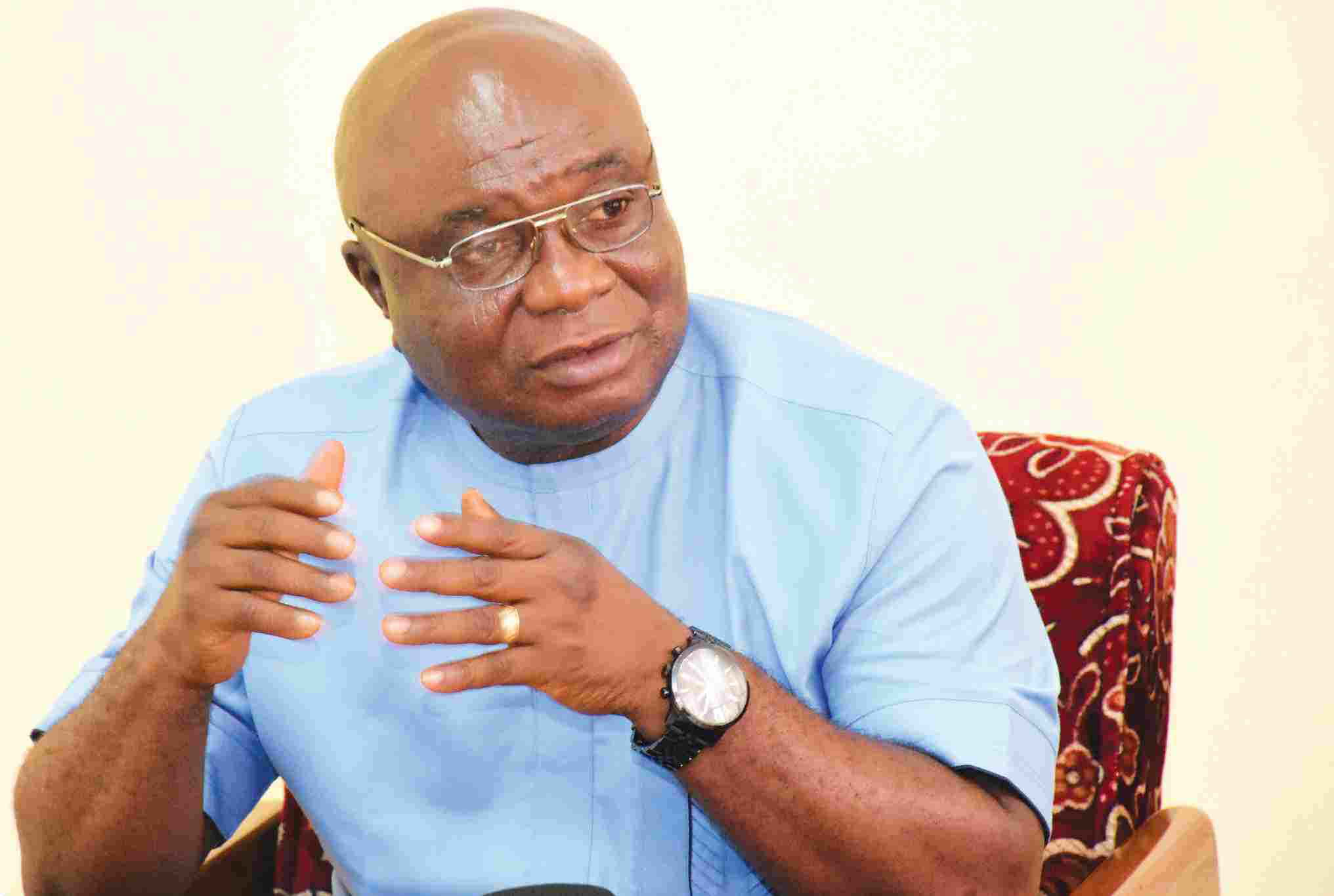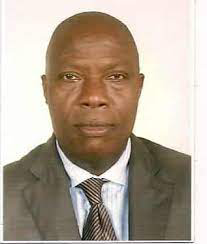News
Investigation: Gov. Okowa Government, House of Assembly in a multi-billion naira scandal (PART 1)

Although Delta state government officials denied complicity in financial irregularities, and extra-budgetary spending in Delta, this report by Markson ISAAC, unearths a reckless spree of misappropriation of funds, financial infractions, among other corrupt acts.
The Delta State Auditor-General’s annual report released on December 31, 2020, has revealed wanton lopsided expenditures, disregard for financial regulations amid other irregularities by Ministries, Department and Agencies (MDAs) of the state.
Office of the Secretary to State Government fails to account for N278.5M
A study of the report reveals how the Office of the Secretary to the State Government (OSSG) could not account for N278.5m spent in the 2019 fiscal year. Careful analysis of the report as captured in annexure 111 showed how Festus Ovie Agas and Chiedu Ebie as Secretaries to the Delta state government respectively were queried for sixteen payments, amounting to N278.5 million.
Chiedu Ebie and Permanent Secretary, OSSG, Austin Oghoro, also spent N3.361m on training but could not provide evidence of the spending.
Reacting to the allegation, Ebie absolved himself of any wrongdoing adding that he was not the only one that occupied the position in 2019. Ebie took over from the present Chief of Staff to the Governor, Festus Ovie Agas, in July 2019.

Immediate past SSG, Mr. Chiedu Ebie
Despite not having any budget line, the N3.361m queried in the report was paid to the Special Assistant to the Governor, Emuoboh Gbagi, for training on December 31, 2019, Ebie disclosed.
The fund was approved and paid to Gbagi when Ebie was at the helms of affairs in 2019.
“I was appointed in July, and the SSG office covers every area. So the ‘vote of charge’ are accessed by very many appointees, and the fact that it is domiciled in the SSG’s office does not mean that it was the SSG that committed such offence.
“After approvals or payment has been given to them, the onus rest on them to do the necessary retirements, as such that cannot be held against the SSG,” he said
Ebie added that ‘financial window dressing’ was done in the audit office for almost all the MDAs after the audit report indicted them, especially for those domiciled in the SSG’s office.
“When the audit report came out, there were red flags. The office of the Director of Finance and Accounts, DFA in the SSG’s office reached out to those concerned and I think those red flags raised in the audit report were resolved.”
Furthermore, Ebie said it is usual practice for the OSSG through the ‘vote of charge’ domiciled in the OSSG to give approval to people-oriented programs proposed by political appointees within the SSG’s approval limit. He argued that if such an appointee cannot account for funds approved for any program, it should not be recorded against the office of the secretary to the state government but the concerned person or his/her office.
He later disclosed that the vouchers that the red flags in the audit report have been regularized.
Meanwhile, the youth special adviser, Gbagi, denied collecting any funds from the OSSG for training in 2019 as captured in the report.
Gbagi claimed the only fund he accessed through the vote of charge of the OSSG (SSG/2684/19) in 2019 was furniture allowance.
In the same vein, the report also indicted the Delta State House of Assembly (DSHA). The clerk of the Assembly, Mrs. Lyna Ocholor, bought unspecified gift items worth N48.9million. The fund was paid with payment voucher number DTHA/1231/2019.
Ocholor was also queried for the furnishing of a press centre at the cost of N37.5m and could not provide receipts and audit certificate for the last tranche of vehicles, amounting to N303m out of the N1.4bn approved for the purchase of official cars for members of the House of Assembly.

Delta State Speaker, Sheriff Oborevworhi and the Clerk, Lyna Ocholor
Delta State Speaker, Sheriff Oborevworhi and the Clerk, Lyna Ocholor
The reporter contacted the clerk for comment, and she asked for a meeting in her office on October 18.
In between these times, it was observed that the leadership of the Assembly began a swift race to harmonize interests between the Office of the Auditor-General and the Assembly’s leadership.
Speaking to this reporter in her Asaba office on October 18, Ocholor said that the N303 million queried by the Auditor-General was part of the approved N1.4bn used for the purchase of official vehicles for House of Assembly members.
She said the vehicles were supplied in three tranches, and the Auditor-General issued audit certificates for the first two supplies. She said she assumed that the audit certificates for the first two tranches cover the last tranche.
But her assumption was wrong from the point of financial regulation, which states that audit certificate is issued on items supplied and not done in anticipation. Audit certificate is only issued upon appropriate retirements of receipts.
“The N303million was part of the N1.4 billion approved for the purchase of official vehicles for Honourable Members. The vehicles were supplied in three tranches, the audit office issued certificates for the first, two and I thought it covers the last tranche of the supply.
“My hands are clean. What I think happened was a lack of due diligence on the part of the Auditor-General. Only God knows what he wants. But thank God the House Committee on Public Accounts has cleared me and a letter has been sent to the Auditor-General office to update its website.”
Efforts to get details of the transactions, including specific gift items bought and name and contact of the contractor that supplied the vehicles amongst others via a Freedom of Information Act (FOIA) application to the clerk on November 4, was greeted with silence.
The budget approved for the state House of Assembly in 2019 did not contain funds expended on the gifts items and furnishing of the press centre.
Assembly Clerk, officials contradict self
When contacted, the chairman, House on Public Accounts Committee, Anthony Elekeokwuri, said that his committee has given the clerk a clean bill upon her explanation. The provisions of Order XV, Rule 110, sub-rule (2) of the Rules of Delta State House of Assembly 2012, also mandate the PAC to examine accounts of government, its appropriation and expenditure, alongside the State Auditor’s Report.

Hon. Anthony Elekeokwuri
Elekeokwuri acknowledged that the clerk and other state officials were queried for improper retirements, extra-budgetary expenditures without approvals and absence of audit certificates, amongst others but added that they were cleared of wrongdoing.
This, however, contradicts the position of another member of the committee, Felix Anirah, who insisted that no such clearance was issued to the MDAs and that, upon receiving the Auditor-General’s report, the concerned MDAs were invited and later directed to reconcile with the Auditor-General’s office.
Findings showed that the report got to the Auditor-General on October 18 and was yet to be considered as at the time of filing this report.
Ocholor had earlier informed this newspaper that the Public Accounts Committee report absolving her of any wrongdoing was sent on August 3, 2021.
The immediate past SSG, Chiedu Ebie; Executive Assistant on Communication to Governor, Oghenesivbe Latimore; and Special Adviser to the Governor, Emuoboh Gbagi corroborated Anirah’s assertion that they were asked to go back to the Auditor-General for clearance.
Insider sources told this reporter that the purported clearance by the Assembly Committee was done to satisfy vested political interest to let the indicted MDAs off the hook and insisted the Auditor-General did a professional job.
It was also observed that upon the commencement of this report, the clerk, alongside some members of the public accounts committee, have been making frantic efforts to effect an update on Auditor-General’s web portal.
“No wonder the rat race to update our portal. Seems they are aware that you are investigating the irregularities red-flagged in the Auditor-General’s report,” a senior staff of the audit department said.
Sources say that members of the assembly were given Landcruiser Prado Jeep (VXL) as official vehicles. Even more, the cost of the vehicles purchased for the assembly members was unduly inflated. The figures in the financial report imply that the unit cost for one Landcruiser Prado Jeep (VXL) isN54.1 million. But a market price survey conducted showed that as at October 2020, the unit price of the car was N34 million. When asked, a reputable car company based in Lagos, YMG Autos, it said buying 25 new Landcruiser Prado Jeeps, would cost N850m. But a total of N1.4 billion was approved for the purchase of vehicles for the House members.
It implies that over N500 million naira, which represents 59.1% markup was approved for the purchase of the vehicles.
Upon receipt of the FOIA request sent to the Clerk’s office on November 4, after initially adjourning the plenary till November 16, the State House of Assembly quickly summoned an emergency plenary on November 11 to deliberate on Delta State Audit Law amendment bill, 2021 amongst other things.
In an unprecedented departure from the norm, the bill scaled through 1st, 2nd, 3rd readings and was passed the same day. Elekeokwuri denied that the speedy passage of the bill was connected with the ongoing investigation by this newspaper.
Calls, short message service and WhatsApp messages sent to the Speaker, Hon. Sherriff Oborevwori on November 11 to ascertain why the Delta State Audit amendment Bill 2021 was hurriedly presented and passed was ignored.

Commissioner for Agric and natural resources, Julius Egbedi
Ministry of Agriculture enmeshed in massive suspicious spending
The agriculture and natural resources commissioner, Julius Egbedi was caught in the web of reckless financial infractions. The ministry could not account for N5.58m expended on undisclosed items. When contacted, Egbedi refused to reply to messages sent to his known phone number. In a similar vein, the State Civil Service Commission could not account for N2.17m expended on unspecified expenditure.
Ministry of Health spent N60M for NHC hosting, N6M without approval
An analysis of the 2019 audit report revealed the Delta State health ministry incurred N20 million as extra-budgetary expenditure for hosting the 62nd National Council of Health meeting in the state. The ministry spent N60 million instead of N40 million approved for this purpose. Even then, the ministry could not provide evidence of services and items purchased with the N60m.
The same ministry was also involved in some financial infractions in the year under review. Dr. Mordi Ononye led health ministry was specifically queried on the payment of 3 vouchers amounting to N6.5m on unspecified items. There were no receipts, neither was appropriate approval given and the expenses were not specified.
Board of Internal Revenue: Not a good example
The Delta State Board of Internal Revenue is home to expenditures contravening financial laws of the state. In the Auditor-General’s report, a total of 28 vouchers amounting to N107.74m were queried. Contacted on the issues raised in the report, the chairman of Delta Board, Monday Onyeame, declined to give any comments. Rather, he asked this reporter to contact the Auditor-General.
Public Accounts Committee never captured all defaulters – Investigation
Investigations revealed that the report of the Public Accounts Committee presented during the August 3, 2021 plenary was defective. The committee only cleared six of the 14 MDAs alleged to have contravened financial regulations of the state. According to page two of the Public Accounts Committee report on the review of the 2019 Auditor-General report, MDAs cleared include Finance, Works, Basic and Secondary Education, Health, Permanent secretary, OSSG and Clerk of the House of Assembly. The Elekeokwuri – led committee only cleared six out of the fourteen that were queried, committee report presented to the House on August 3 stated.
My Report Is certified – Auditor General
Section 125 (2) of the 1999 Constitution as amended gives the Auditor-General of the State the responsibility to conduct preliminary oversight after the Accountant General presents government expenditures.

Paul Aghenenu
The section states: “The public accounts of a State and all offices and courts of the State shall be audited by the Auditor-General for the State who shall submit his reports to the House of Assembly of the State concerned….”
It is on this premise that the Delta State Auditor-General, Paul Aghanenu, insists that the 2019 audited report is genuine.
According to him, the report is both in print and soft copies, which have been uploaded on the state government and audit department’s portals.
“I have done my job as you have seen on the state portal and I can’t answer further questions from you till I get clearance from the SSG.”
Freedom of Information request ignored
Freedom of Information Act (FOIA) requests made to the Clerk of the Delta State House of Assembly, Lyna Ocholor; Commissioner of Health, Dr. Ononye Mordi; Chairman, Delta State Civil Service Commission, Chief Nkem Okwuofu; and Office of the Secretary to the State Government, Patrick Ukah, seeking information and evidence of project execution and audit clearance certificates were ignored.
The FOIA requests to these offices specifically requested comprehensive details and documents on funds expended, type of gifts bought, receipts, list of bidders for the vehicles supply, name of the contractor, approval letters for the contract award, date of supply at the Assembly Complex amongst others.
Expert reactions
Reacting to the financial irregularities by the MDAs, a Lagos based financial expert, Gbolahan Olojede, called on the Delta State governor, Ifeanyi Okowa, to set up an independent panel to investigate the massive financial irregularities committed by members of his cabinet to sustain his transparency mantra.
Olojede who is the Executive Director, DMA Advisory and Management Services, said that it is almost impossible for a House committee to affirm query or indict the clerk of any state assembly of any wrongdoing, even if there are glaring evidence, except the Speaker or principal members were not carried along.
On the N60 million claimed to have been spent by the health commissioner, Ononye, Olojede called on civil society groups to take up the issue and demand that the Delta State government investigate the fraudulent deeds and ensure appropriate prosecution.
Another civil society organization, Africa Center for Accountability and Financial Value said it would commence legal steps against the governor if he fails to set up an investigative panel to probe the grand corruption, extra-budgetary expenditure and misappropriation of funds as contained in the 2019 financial report.
The position was made known by the Executive Director, Ishiola Akonji, in an interview in Asaba, Delta state capital. Akonji wondered why state governors would allow appointees to siphon public funds without questioning them.
“The failure to investigate the allegations of grand corruption contained in the 2019 Auditor-General’s annual audited report constitutes a grave violation of the duty placed on the Delta state government to take appropriate measures to promote transparency and accountability in the management of public funds.
“Mandamus is a high prerogative writ which lies to secure the performance of public duty. It gives a command that a duty of a public nature which normally, though not necessarily is imposed by statute but is neglected or refused to be done after due demand, be done.
“If there is a discretion to perform the duty, the court has the power to examine whether the discretion to refuse to act has been properly exercised,” he said.
Akonji also opined that the recovery of the missing funds would reduce the abysmal decline of state facilities.
“Recovering the alleged missing public funds from the MDAs will reduce further looting of public funds, enable the state government to meet its obligation and reduce the growing level of the decline of state facilities, poverty and unemployment.
“These damning revelations by this report suggest a grave violation of public trust, the Nigerian Constitution of 1999, and international human rights and anti-corruption standards. Spending public funds without appropriate approvals will create opportunities for corruption.
“Transparent and accountable public financial management is a key pillar of good governance, and of vital importance to provide public goods and services to citizens, as well as to create and maintain fair and sustainable economic and social conditions in the country,” he noted.
This investigation is supported by the John D. and Catherine T. MacArthur Foundation and the International Centre for Investigative Reporting.”
-

 Politics5 days ago
Politics5 days agoPROPHESY TO PRESIDENT BOLA AHMED TINUBU ABOUT 2027
-

 News5 days ago
News5 days agoFamily, Friends Celebrate Jailed Former Deputy Senate President, Ike Ekweremadu’s Birthday
-

 Business3 days ago
Business3 days agoNigeria’s Azikiel Refinery to Begin Operations in 2025
-

 Business6 days ago
Business6 days agoBaraza: Bribena pleads for understanding, highlights solutions to organization’s problems
-

 Politics2 days ago
Politics2 days agoYou Have a Few Days to go, Gov. Fubara Tells LGA Chairmen
-

 Politics5 days ago
Politics5 days agoFubara Swears-in Dagogo as Attorney-General, to Probe Wike’s 8 Years As Governor
-

 Business5 days ago
Business5 days agoGunmen kidnap Dangote cement workers in Edo
-

 Crime5 days ago
Crime5 days ago$2.5bn fraud: EFCC to collaborate with UK prosecutors in Diezani’s case




